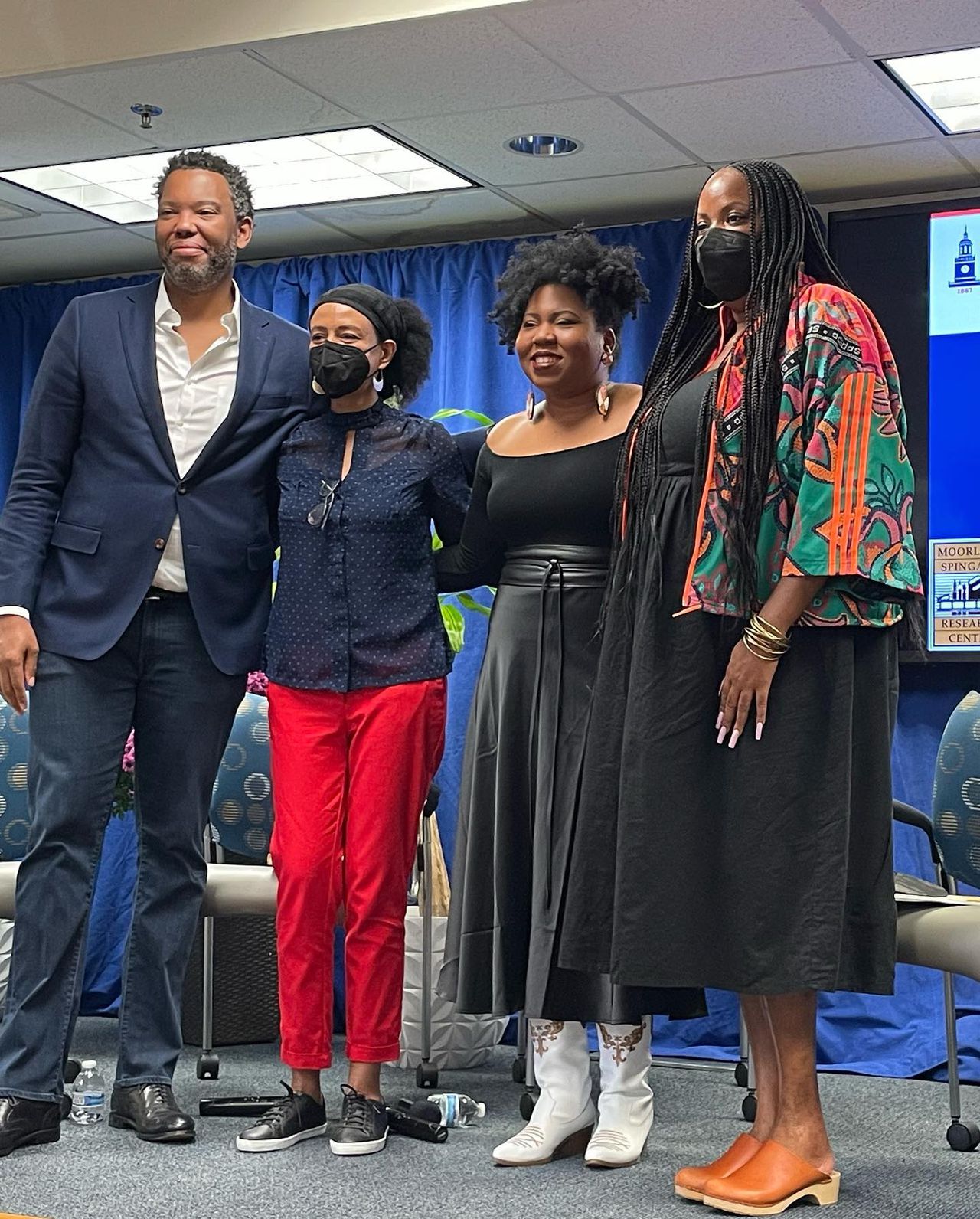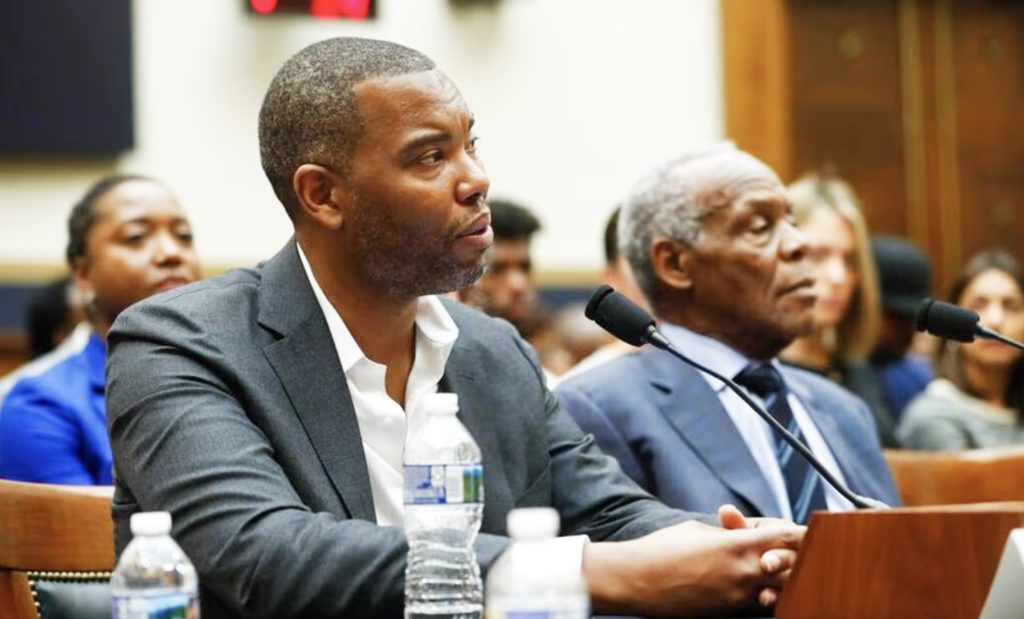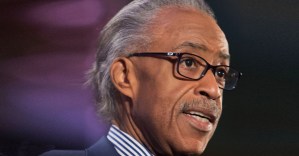How many topics can you fit into a 20-minute talk with Ta-Nehisi Coates?
On a recent Thursday afternoon, ahead of a trip Coates will make to Alabama to receive a major literary award, I was about to find out. That morning, Coates’ team asked if he could push our interview back by 10 minutes. They wanted to make sure he was comfortably seated in the back seat of a car and could speak without interruption.
A few hours later, Coates phoned in from New York, en route to the Apollo Theater in Harlem. He’s the legendary performance hall’s Master Artist in Residence. Earlier this summer, Coates and Kamilah Forbes, the executive producer for the Apollo, announced the inaugural [at] The Intersection festival, a three-day summit of art and ideas. Set to debut in October, the event bills itself as a showcase of Black creativity and fellowship featuring keynotes and performances from luminaries including journalist Michael Harriot, bassist Endea Owens, chef Carla Hall, and award-winning actress Kerry Washington.
“We gotta do some promo work, so I’m on my way there,” Coates tells me.
He’s also working on his next book. When I asked about the subject, he didn’t reveal too many details, but he did offer a short description.
“It’s a book about writing and the place of writing in our culture and politics.”
Coates’ passion and achievement in the craft of writing is being recognized in Alabama. The journalist and cultural critic is the recipient of this year’s Fitzgerald Prize for Literary Excellence. The award, granted by The Scott and Zelda Fitzgerald Museum in Montgomery, honors an author whose work continues the legacy of storytelling and social insight typified by novelist and playwright F. Scott Fitzgerald.
“The Great Gatsby is like one of my three favorite books ever. So it’s a huge, huge honor,” said Coates.
Coates will accept the award on Sept. 22 during “An Evening with Ta-Nehisi Coates Celebrating American Storytelling.” The Friday evening award ceremony and lecture kicks off at 6:30 p.m. at Ralph David Abernathy Hall on the campus of Alabama State University. The event also will feature Coates in conversation with two ASU professors: Dr. Derryn Moten and Dr. Jaqueline Trimble. (Tickets to the ceremony and lecture are $28 and are available on Eventbrite.)
Coates’ travel and in-person lecture schedule is back up and running after a couple of dormant years during the height of the COVID-19 pandemic.
Last year, his activities included moderating the inaugural MSRC International Black Writers Festival at Howard University, where one of the participants was Ashley Jones, the author of “Reparations Now!” and Alabama’s first Black and youngest poet laureate.

If you’ve been keeping up with Coates in the news, you may have read about his appearance at a school board meeting in South Carolina. He sat next to Mary Wood, an English teacher who had asked her Advanced Placement students to read “Between the World and Me” and identify themes in the work. Some of her students emailed school board members, saying the lesson made them feel “uncomfortable” and “ashamed to be Caucasian.” The books were collected and the assignment was ended, according to multiple reports. South Carolina is one of nearly 20 states to restrict education on race since 2021. An article from the Washington Post this week reported one student’s email said reading the book felt like “reading hate propaganda towards white people.”
Coates is used to finding himself and his writing in the middle of discussions that could influence the course of American history.
In 2014, The Atlantic published “The Case for Reparations,” Coates’ examination of housing discrimination, redlining and segregation. Throughout more than 50 pages in the magazine, Coates unpacked the effects of racist housing policies through the eyes of a cast of people who had been marginalized for generations.
In 2019, Coates, actor Danny Glover, and Sen. Cory Booker (D-NJ) testified before a House Judiciary subcommittee hearing on reparations for slavery. The room had gathered for a hearing on H.R. 40, a bill sponsored by Rep. Sheila Jackson Lee (D-Texas) which called for a commission to study and develop reparations proposals for African Americans.
During his opening statement, Coates directed remarks to Senate Majority Leader Mitch McConnell, who said reparations were not “a good idea” because no one who is currently living is responsible for slavery.
Alabama itself is a case study for examples of reparations and restitution for Black people. In the 1970s, a class action lawsuit from the Tuskegee Syphilis Study resulted in a $10 million settlement. Sarah Collins Rudolph, who was severely injured in the 1963 bombing of the 16th Street Baptist Church, has long called for financial compensation to cover her decades of medical bills.
In 2020, lawyers representing Rudolph wrote a letter to Gov. Kay Ivey asking for an official apology from the state and possible compensation. While Ivey issued an apology, the state has yet to move toward considering financial restitution.











